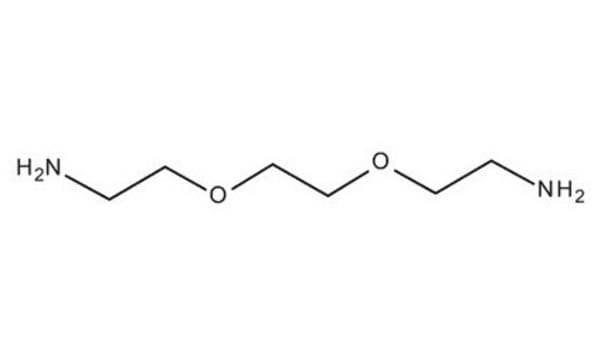All Photos(1)
About This Item
Linear Formula:
ICH2CH2OCH2CH2OCH2CH2I
CAS Number:
Molecular Weight:
369.97
MDL number:
UNSPSC Code:
12352100
PubChem Substance ID:
NACRES:
NA.22
Recommended Products
Quality Level
Assay
96%
form
liquid
refractive index
n20/D 1.572 (lit.)
density
2.028 g/mL at 25 °C (lit.)
functional group
ether
iodo
SMILES string
ICCOCCOCCI
InChI
1S/C6H12I2O2/c7-1-3-9-5-6-10-4-2-8/h1-6H2
InChI key
BCAGFJXMCZSAHD-UHFFFAOYSA-N
Application
1,2- Bis (2-iodoethoxy)ethane was used as crosslinking reagent for synthesis of:
- zirconia-based, alkali-stable strong anion-exchange stationary phase
- silica-coated nanoparticles
- novel shell cross-linked (SCL) micelles with pH-responsive poly(2-(diethylamino)ethyl methacrylate) cores and thermoresponsive poly(N-isopropylacrylamide) coronas
Signal Word
Warning
Hazard Statements
Precautionary Statements
Hazard Classifications
Eye Irrit. 2 - Skin Irrit. 2 - STOT SE 3
Target Organs
Respiratory system
Storage Class Code
10 - Combustible liquids
WGK
WGK 3
Flash Point(F)
235.4 °F - closed cup
Flash Point(C)
113 °C - closed cup
Personal Protective Equipment
dust mask type N95 (US), Eyeshields, Gloves
Choose from one of the most recent versions:
Already Own This Product?
Find documentation for the products that you have recently purchased in the Document Library.
Customers Also Viewed
C McNeff et al.
Analytical biochemistry, 274(2), 181-187 (1999-10-21)
The synthesis and use of a zirconia-based, alkali-stable strong anion-exchange stationary phase are described for the removal of pyrogenic lipopolysaccharides (LPS) from insulin. The strong anion-exchange material is produced by deposition of polyethyleneimine (PEI) onto porous zirconia particles, followed by
Yuting Li et al.
Macromolecular rapid communications, 30(6), 464-468 (2009-03-19)
The mean diameter of poly[2-(dimethylamino)ethyl methacrylate]-block-poly[2-(diisopropylamino)ethyl methacrylate] (PDMA-PDPA) diblock copolymer micelles can be easily adjusted from 27-155 nm (as measured by DLS) by either selective quaternisation of the PDMA block or by adding PDPA homopolymer prior to micellisation; these self-assembled
Xiaoze Jiang et al.
Biomacromolecules, 8(10), 3184-3192 (2007-09-25)
A double hydrophilic ABC triblock copolymer, poly(2-(diethylamino)ethyl methacrylate)-b-poly(2-(dimethylamino)ethyl methacrylate)-b-poly(N-isopropylacrylamide) (PDEA-b-PDMA-b-PNIPAM), containing the well-known pH-responsive PDEA block and thermoresponsive PNIPAM block, was synthesized by atom transfer radical polymerization via sequential monomer addition using ethyl 2-chloropropionate as the initiator. The obtained triblock
Yueyuan Mao et al.
Chemistry (Weinheim an der Bergstrasse, Germany), 21(46), 16623-16630 (2015-09-30)
Two large conjugated naphthalimide derivatives with or without three-methane-bridged thiazole orange (TO3; i.e., compounds 1 a and 2 a, respectively) were designed and synthesized. The fluorescence of the naphthalimide group in compound 1 a at λ=532 nm initially decreased and that for the TO3
Our team of scientists has experience in all areas of research including Life Science, Material Science, Chemical Synthesis, Chromatography, Analytical and many others.
Contact Technical Service
![Bis[2-(2-chloroethoxy)ethyl] ether ≥99.0% (T)](/deepweb/assets/sigmaaldrich/product/structures/333/320/46ff3398-7a62-42b5-b9bc-0a3d0cb0429c/640/46ff3398-7a62-42b5-b9bc-0a3d0cb0429c.png)
![2-[2-(2-Chloroethoxy)ethoxy]ethanol 96%](/deepweb/assets/sigmaaldrich/product/structures/902/295/ff6d7bb1-a7e0-4582-86e1-819084626e67/640/ff6d7bb1-a7e0-4582-86e1-819084626e67.png)











